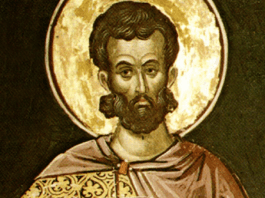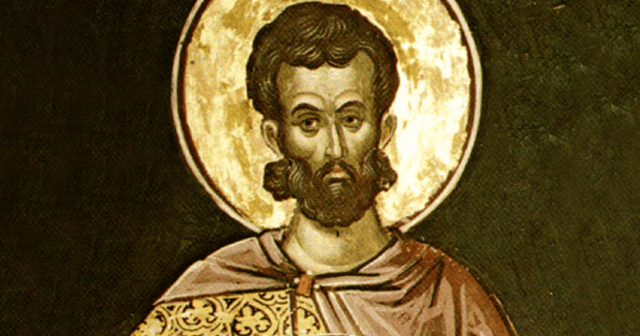
Saint Justin Martyr was born around the year 100 in the Palestinian province of Samaria in modern-day Nablus, the son of Greek-speaking parents whose ancestors were sent as colonists to that area of the Roman Empire. Justin’s father followed the Greek pagan religion and raised his son to do the same, but he also provided Justin with an excellent education in literature and history.
As a young man, Justin became interested in philosophy and looked for truth in the various schools of thought that had spread throughout the empire. But he became frustrated with the professional philosophers’ intellectual conceits and limitations, as well as their apparent indifference to God.
After several years of study, Justin had a life-changing encounter with an old man who urged him to study the Jewish prophets. He told Justin that these authors had not only spoken by God’s inspiration, but also predicted the coming of Christ and the foundation of his Church. The old man was not searching for truth but for some of his family. Nonetheless they began a discussion in which Justin identified himself as a philologian, a lover of reason. The old man challenged him — why was he not a lover of truth, a lover of deeds. Justin told him that reason led to truth, and philosophy led to happiness. This was certainly an interesting thing for Justin to say since he had not found the truth in the study of reason or happiness in his quest among the philosophers! Perhaps the old man sensed this for he asked for Justin’s definition of philosophy and of happiness.
In the long discussion that followed, Justin spoke eloquently to the old man’s searching questions but even Justin had to admit that philosophers may talk about God but had never seen him, may discuss the soul but didn’t really know it. But if the philosophers whom Justin admired and followed couldn’t, then nobody could, right? The old man told him about the ancient prophets, the Hebrew prophets, who had talked not of ideas but of what they had seen and heard, what they knew and experienced. And this was God. The old man ended the conversation by telling Justin to pray that the gates of light be opened to him.
Inflamed by this conversation, Justin sought out the Scriptures and came to love them. Christ words “possess a terrible power in themselves, and are sufficient to inspire those who turn aside from the path of rectitude with awe; while the sweetest rest is afforded those who make a diligent practice of them.”
After his conversion, Justin continued to wear the type of cloak that Greek culture associated with the philosophers. Inspired by the dedicated example of other Catholics whom he had seen put to death for their faith, he embraced a simple and austere lifestyle even after moving to Rome.
Justin was most likely ordained a deacon, since he preached, did not marry, and gave religious instruction in his home. He is best known as the author of early apologetic works which argued for the Catholic faith against the claims of Jews, pagans, and non-Christian philosophers. Several of these works were written to Roman officials, for the purpose of refuting lies that had been told about the Church. Justin sought to convince the rulers of the Roman Empire that they had nothing to gain, and much to lose, by persecuting the Christians.
In order to fulfill this task, Justin gave explicit written descriptions of the early Church’s beliefs and its mode of worship. In modern times, scholars have noted that Justin’s descriptions correspond to the traditions of the Catholic Church on every essential point. Justin describes the weekly Sunday liturgy as a sacrifice, and speaks of the Eucharist as the true body and blood of Christ. He further states that only baptized persons who believe the Church’s teachings, and are free of serious sin, may receive it. Justin also explains in his writings that the Church regards celibacy as a sacred calling, condemns the common practice of killing infants, and looks down on the accumulation of excessive wealth and property.
His first defense of the faith, written to Emperor Antonius Pius around 150, convinced that emperor to regard the Church with tolerance. In 167, however, persecution began again under Emperor Marcus Aurelius. It is not surprising that Justin was arrested during the persecution under Marcus Aurelius. Along with four others (Chariton, Charites, Paeon, and Liberianus) he was brought before the Roman prefect, Rusticus, to be accused under the law that required sacrificing to idols. When Rusticus demanded that they “Obey the gods at once, and submit to the kings,” Justin responded, “To obey the commandments of our Saviour Jesus Christ is worthy neither of blame nor of condemnation.”
When Rusticus asked what doctrines he believed, Justin told him that he had learned all the doctrines available during his quest but finally submitted to the true doctrines of the Christians, even though they didn’t please others. Just before Rusticus sentenced them he asked Justin, “If you are killed do you suppose you will go to heaven?” Justin said, “I do not suppose it, but I know and am fully persuaded of it.” Justin and his fellow martyrs were beheaded in the year 165 and went to be with the Truth Justin had longed for all his life. He is often known as Justin Martyr and his works are still available.
St. Justin Martyr has been regarded as a saint since the earliest centuries of the Church. Eastern Catholics and Eastern Orthodox Christians also celebrate his feast day on June 1.
Photo credit: Public Domain via Wikimedia Commons
The post Saint Justin Martyr appeared first on uCatholic.
Daily Reading
Feast of Saint Stephen, first martyr
Reading 1 Acts 6:8-10; 7:54-59 Stephen, filled with grace and power,was working great wonders and signs among the people.Certain members of the so-called Synagogue of Freedmen,Cyrenians, and Alexandrians,and people from…
Daily Meditation
Joy in the Midst of Sorrow
Click here for daily readings It’s always been odd to me to have a feast of the first martyr the day after Christmas. Yes, as Christians, we know difficult things…




